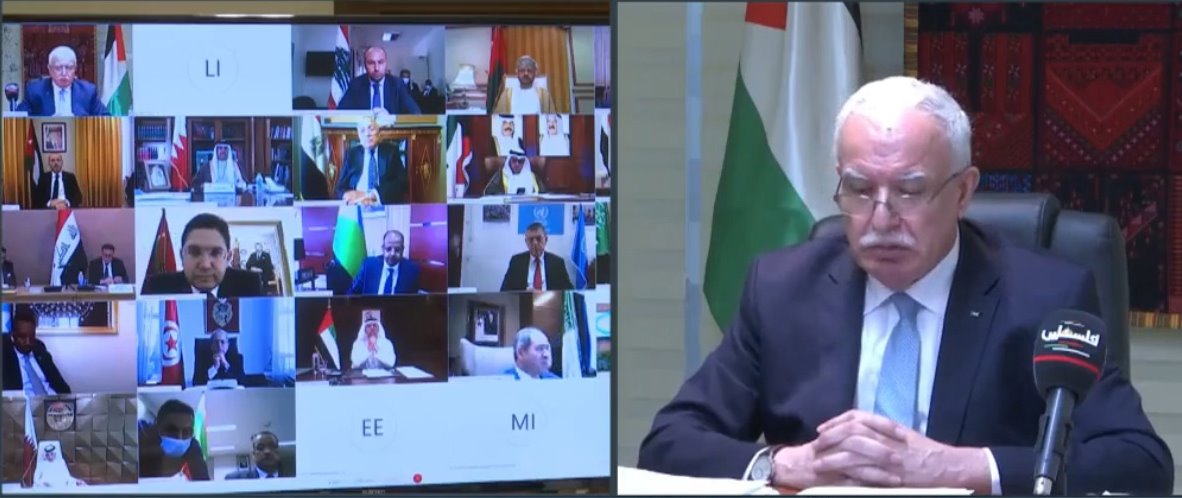Palestinian Minister of Foreign Affairs and Expatriates, Riyad Malki, today called on the Arab League to reject the United Arab Emirates-Israel normalization agreement.
“Otherwise, our meeting will be considered a blessing to the move, or a cover for it, which the state of Palestine will not accept,” Malki, who chairs the current 154th session of the Arab League’s Council at the ministerial level, told Arab foreign ministers during a video-conference meeting.
Malki reiterated that Palestine did not authorize anyone to speak on its behalf, rejecting the idea that some parties have normalized ties with Israel for the good of Palestine.
“We know that the real reason is completely different….We stopped the annexation with our courageous stance and the positions of everyone who rejected this policy,” the minister said.
He thanked the Arab countries that embraced the Palestinian cause and those who defended, protected, and contributed to strengthening it by all means, without speaking on behalf of Palestine.
Malki pointed out that Palestine’s desire to preserve the Arab consensus should not be interpreted as weakness, stressing that “we do not feel weak to defend our principles, constants, rights and our cause.”
He also thanked the Arab countries that rejected the US Secretary of State’s blackmail to normalize ties with the occupation state.
“Our ordinary session takes place in extraordinary circumstances, and we meet with enormous challenges ahead, challenges that we have not experienced before,” the minister said. “We have always believed that the Palestinian issue is above all differences, as it was always the point of gathering and not the point of division.”
The American-Israeli-Emirati tripartite declaration was “an earthquake, and instead of placating us, we started to defend ourselves and our cause, and the situation turned so that we became the rioters because we dared to stand in the face of the earthquake as we stood against the US administration when it violated our rights,” he added.
The minister said Palestine called for an emergency meeting of the Arab League’s Council at the ministerial level to discuss the Emirati move as the issue requires an emergency meeting.
“We were surprised this time that an Arab country objected to our request to hold an emergency meeting and asked to replace it with the ordinary session. When we agreed to its request, the same country objected to our request to add an article to the program of the session, while another country threatened to submit an alternative draft resolution,” minister Malki said.
“How do we explain these steps?” Malki asked. “Who determines that? Are they the owners of influence and money or what? Did the State of Palestine go too far in its request to hold an emergency meeting or even add an article to new works of the Arab League’s Council? Did it cross the red lines that were drawn, but without announcing them? We need to know these new red lines to decide whether we want to be a part of them or not.”
The Foreign Minister wondered if the Arab Peace Initiative that talks about normalizing relations with Israel after it withdraws from all the occupied Palestinian territories is still on the table or not.
“We ask here whether our decisions regarding it (the Arab Peace Initiative) are in place or not, and if we are still committed to it as it came and was adopted at the Beirut Summit in 2002?” Malki said.
Minister Malki also requested that no country should speak on behalf of Palestine “as Palestine has not authorized anyone to do so.”



